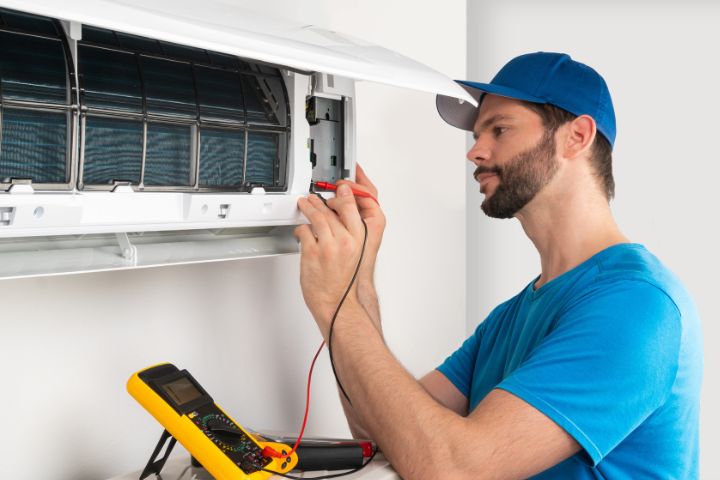A skilled trade career can be an ideal job path for naturally curious people. The work of a skilled trade professional is also great for people who grew up interested in building things, solving problems, or fixing things. Pursuing a career in this field is a fantastic way to continue these interests as an adult. So, what is a “skilled trade career”? How do you choose the best trade for your interests? And how do you make sure you get the education you need to get started?
Skilled trade means a service that involves one or more highly specialized skills. Often, skilled trade careers provide essential services. This could be making sure people have heat or building a roof over their head. From plumbers to construction workers to electrical technicians, skilled trade careers are a necessary part of every community.
Explore our Skilled trades programs!
Three reasons to pursue a skilled trade career
1. Education costs
A skilled trade is a career option for people interested in a career training at a typically lower cost than a four-year degree. That is because most aspiring skilled trades professionals do not need a bachelor’s degree or prior experience in the field.1 In fact, some skilled trades training programs can be completed in just a year. As a result, someone is able to train in a relatively quick amount of time.
But no matter which skilled trade you pursue, you will need some training and education. Depending on the skilled trade, you can get this training through an associate degree program, a diploma/certificate program, or pursue a certification.
As you research different education options, make sure you choose an accredited program or school. Accreditation means the program and/or school meets the recognized educational standards for your skilled trade industry. You should also consider if the program offers hands-on learning experiences. This is an ideal way to learn the work of a skilled trade career.
2. Get earning quicker
Because most skilled trades do not need a four-year degree, you can seek employment faster. Many skilled trade students can learn the concepts needed for their trade in less than a year.
Some programs offer a combination of hands-on training and classroom education. Students can practice skills while in school and have the opportunity to leave prepared to work in the real world.
3. A good career that can offer stability
The world is changing, and that includes the types of jobs available to people. But the world of skilled trades has been less affected by changing technology. People still need a human being when they call for help fixing their heater, they need electrical work done, or when they are having plumbing problems.
In addition, According to the U.S. Bureau of Labor Statistics, HVAC technicians (Heating, Air Conditioning, and Refrigeration mechanics and installers) have an especially optimistic job outlook over the next decade. Employment of HVAC technicians is expected to grow 6% nationwide from 2022 to 2032. That is faster than the average for all occupations.2
What skilled trade careers can you pursue?
Trade careers exist across a variety of industries such as:
- Construction
- Energy
- Industrial
- Residential
Some skilled trade careers will cross over into one or more of these industries. They will cross paths with workers in other skilled trades as well. There are dozens of skilled trade careers to choose from within these industries. They include:
- Electrical technician
- HVAC technician
- Welder
- Carpenter
- Construction worker
- And more
Picking which one is right for you!
To find the best skilled trade for you, consider your strengths and interests. For example, the work of an electrical technician or an HVAC technician may suit someone with a natural curiosity for how things work. Both skilled trades are also a great fit for people who enjoy building things or using their hands.
The work of an electrical technician may include:
- Installing, maintaining and repairing various electrical components.
- The installation of light applications, fixtures, differing bulbs and lighting requirements for residential, commercial and industrial settings.
- Using various meters and test equipment.
- Perform advanced troubleshooting.
- Adhere to safety guidelines.
For HVAC workers, the day-to-day may look like:
- Installing HVACR systems and keeping them cleaned and maintained
- Inspecting and testing HVACR systems
- Installing electrical components and wires
- Repairing worn or defective parts
- Replacing parts when necessary
- Providing climate-controlled environments for refrigeration systems
Some HVAC technicians can choose more specific specializations too. These include focuses on solar panels, commercial refrigeration, radiant heating systems, and more. Some of these areas may require additional experience or training as well.
Explore our programs at Dorsey College
Dorsey College offers training programs for future HVAC technicians and Electrical technicians. Graduates love these programs because:
- No prior experience is necessary. All you need is a desire to learn and the physical stamina required for these skilled trades.
- Both programs include opportunities for hands-on learning. Students will have the chance to learn the skills needed for success outside the classroom.
- You can complete either program in as little as one year.
No matter which program you pursue, students will have the opportunity to learn valuable skills needed to succeed. Get started on your skilled trade career with training from Dorsey College today!
Sources:

